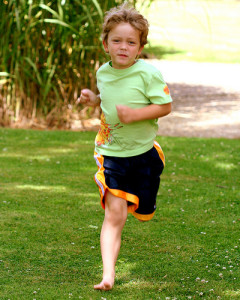Sizing Up the Competition
Competition among siblings is integral to most families. Our natural instinct is to survive and thrive. Many twin pairs, however, have a different experience with sibling rivalry and competitiveness because of their intimate relationship.
While twins fight just as much—or possibly more—than nontwin siblings, their feelings about surpassing or outdoing their twin can be conflicting and confusing.
More often than not, identical twins that compete in the same sport are wholly supportive of and noncompetitive with their sibling. Often they will say that if they have to lose to someone, they are happy to lose to their twin. In fact, twins who play doubles tennis or belong to the same basketball team demonstrate a synergy that is enviable and powerful. Some twins feel as if they would not be as successful if not for the momentum created by the friendly twin-to-twin competition.
Oftentimes, however, this reliance upon each other for performance outcomes makes it difficult to pursue their athletic aspirations by themselves.
What happens when twins do not have the luxury of sublimating their rivalrous feelings into the realm of competitive sports, music, fashion, or show business? They must figure out alternative ways to manage their competitive strivings. Frequently, I encounter twins who unknowingly have cultivated their self-esteem by comparing themselves with their less successful twin.
For example, one woman confided in me that she had never realized how much outshining her sister fueled her self-worth until her sister retired, bought a bigger house, and began taking trips that my patient envied. This woman was shocked and ashamed that she felt this way because she had not experienced such intensely competitive feelings before. She had been the “good twin” growing up, having had a much happier childhood than her sister.
Experiencing self-esteem in response to a twin’s lesser accomplishments demonstrates a lack of internal strength. The continual competitive ups and downs become the measurements of success rather than being simply the self-contained experiences of two unique individuals.
Considering how endlessly twins are compared and contrasted throughout their entire lives the prevalence of this dynamic is understandable. However, living with this susceptibility makes one’s capacity to feel secure directly linked to another’s difficulty. I visualize this internal dilemma like a house of cards—vulnerable to collapse at the slightest change, shift, or movement. Psychological strength comes from resilience and self-regulation. Twin pairs forced to self-regulate according to the behaviors of each other are at risk of becoming trapped and resentful, ever pulled down into the mire of interdependence that does not allow for individual strengths and talents to emerge.


